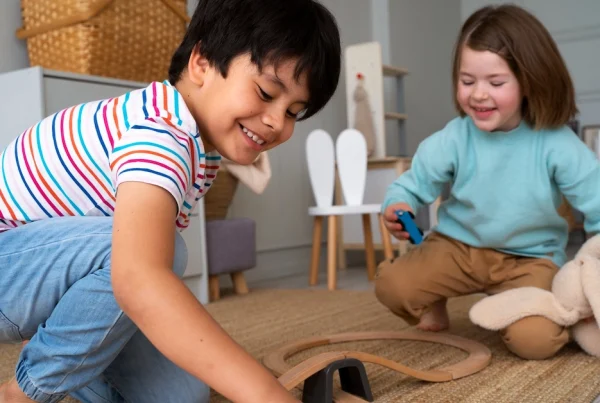Ever wondered, “What to ask during a parent-teacher meeting?” Sitting across from your child’s teacher, listening to updates about progress, strengths, or areas of growth, can sometimes stir up a mix of pride, curiosity, and even anxiety. But beyond those emotions lies a wonderful truth: Parent-Teacher Meetings are an opportunity for partnership and collaboration between parents and school.
When parents and teachers come together, they build a bridge between home and school. This collaboration ensures that children receive the consistent support they need to grow not only academically, but also socially, emotionally, and spiritually.
The teachers at our schools view these conversations as a reflection of a fellowship and shared purpose: working together for the good of each child, just as 1 Corinthians 3:9 reminds us, “For we are co-workers in God’s service.”
Approaching a Parent-Teacher Meeting (PTM) with openness, humility, and curiosity helps parents gain valuable insight and build a sense of trust with teachers.
Here are some thoughtful questions you can bring to your next parent-teacher conferences to make it more meaningful and productive.
Questions About Academic Progress
Academic growth is often the first thing parents think about during PTMs. But rather than asking only about grades or test results, focus on learning habits and growth over time. These questions help teachers provide a fuller picture of your child’s academic journey:
- How is my child progressing in core subjects like reading, math, and science?
- What are my child’s strengths in learning?
- Are there specific areas where they need more support or encouragement?
- How does my child approach challenges or mistakes in class?
These insights help parents understand not just what their child is learning, but how they learn and how to reinforce those habits at home.
Read Also: Responsive and Gentle Parenting: A Christian Guide to Raising Emotionally Healthy Kids
Questions About Social and Emotional Development
A child’s social and emotional growth is just as important as their academic success. PTMs are a great time to ask about how your child interacts with others, handles emotions, and adapts to the classroom environment.
Consider asking:
- How does my child get along with their classmates?
- Do they participate actively or tend to be more reserved?
- How do they handle conflicts or frustrations?
- Are there areas where I can support their emotional well-being at home?
Teachers observe children in a social setting every day, so their perspective can be incredibly helpful in understanding your child’s personality and needs.
Questions About Classroom Dynamics and Learning Environment
Every classroom has its own rhythm and atmosphere, shaped by the teacher’s approach, group dynamics, and learning style. Asking about the classroom environment helps parents understand how their child fits into that space.
You might ask:
- How does my child contribute to the classroom community?
- What kind of learning environment do they seem to thrive in?
- How do you encourage collaboration, creativity, and respect among students?
- Are there any school activities or group projects my child particularly enjoys?
- What is your teaching style, and how can I keep things consistent at home?
Understanding these aspects can help parents reinforce positive habits and conversations at home, showing children that school is not just a place for learning, but also for belonging.
Read Also: Tips for Mindful Parenting in the Digital Age: Finding Balance for Your Kids
Questions About Growth and Next Steps
PTMs are also the perfect opportunity to look ahead. This is your chance to discuss how you and the teacher can partner together to support your child’s next stage of growth.
You could ask:
- What goals should we focus on for the coming months?
- How can I support my child’s learning at home in practical ways?
- Are there enrichment or extracurricular activities that could help my child develop their interests or strengths?
- How will we measure progress or follow up on these goals?
When parents and teachers align on a shared growth plan, children benefit from consistency and encouragement both at home and at school.
 Approaching PTMs with Humility and Open Heart
Approaching PTMs with Humility and Open Heart
Beyond the important questions themselves, the spirit in which you approach a Parent-Teacher Meeting (PTM) makes a big difference. These conversations work best when guided by mutual respect, trust, and a shared love for the child.
When parents come prepared and open to a productive conversation, it builds a bridge between home and school that supports the child’s overall growth.
As Christian parents, we can model humility and grace in these moments by listening with an open heart, seeking understanding, and viewing teachers as God-given partners in our child’s education. This attitude not only strengthens the relationships between parents and teachers but also encourages children to develop faith-based social skills that last far beyond the classroom.
Coming with a growth mindset also helps parents approach these meetings with excitement and openness. It is a time to celebrate the child’s academic progress, recognize academic skills that need nurturing, and learn strategies to support their continued success.
By asking specific questions about how your child is performing both in lessons and class discussions, you can gain insight into their learning journey and discover new ways to help them thrive.
The Bible reminds us in Proverbs 19:20, “Listen to advice and accept discipline, and at the end you will be counted among the wise.” PTMs are not about judgment but rather about wisdom, reflection, and shared purpose.
They allow families to communicate concerns, celebrate growth, and align with teachers to ensure the best outcomes for each child’s academic performance and school success.
In addition, parent-teacher meetings are a wonderful time to express appreciation for the teachers who pour so much care into our children’s lives. A few kind words, encouragement, or sharing small examples of growth at home can go a long way in showing gratitude. As 1 Thessalonians 5:11 reminds us, “Therefore encourage one another and build each other up.”
We believe education is a partnership rooted in faith. When families and teachers come together prayerfully, they form a united team that helps children flourish academically, emotionally, and spiritually.
With humility and trust, parents can walk alongside teachers to nurture not only their child’s performance but also their heart and character, preparing them for a life of purpose and service to God.
If you’re looking for more guidance and practical encouragement on parenting with faith and wisdom, you can listen to our parenting podcast.
Working Together for the Good of Every Child
Parent-teacher meetings may feel nerve-wracking at first, but they’re truly one of the most valuable moments in a child’s educational journey. They open the door for honest communication, shared understanding, and prayerful collaboration.
When approached with humility, curiosity, and love, these meetings can strengthen not only the partnership between home and school but also your child’s confidence and sense of belonging.
Every conversation becomes a reminder that education is not a solo journey but a community effort, guided by God’s wisdom and sustained by faith. In our school, we stand alongside parents as co-laborers in shaping hearts and minds for Christ.
Read Also: Benefits of Collaborative Parenting: How to Work Together for Your Child’s Well-Being
Choosing a School that Partners with You
At Sekolah Pelita Harapan (SPH), we believe that children thrive when parents and teachers work together, guided by shared faith and purpose. As Ecclesiastes 4:9 reminds us, “Two are better than one, because they have a good return for their labor.”
Our partnership with families reflects the same truth: children flourish when home and school walk together in God’s wisdom. If you are seeking an environment where your child’s curiosity, critical thinking, and faith grow together, as an IB School Jakarta, SPH offers an educational journey shaped by excellence and discipleship.
SPH offers both the International Baccalaureate and Cambridge curriculum, renowned international curricula designed to help each child thrive in their God-given potential while developing resilience, compassion, and academic strength at every grade level.
As an international school in Indonesia, SPH serves as a second home for children where learning continues beyond school hours and every child is valued, guided, and loved. Through purposeful learning experiences, dedicated teachers, and a Christ-centered community, students gain the insight and confidence they need to impact the world with truth and grace.
Join us in shaping hearts and minds for God’s kingdom. Visit SPH to discover how faith and education unite to prepare your child for a successful and meaningful future.









